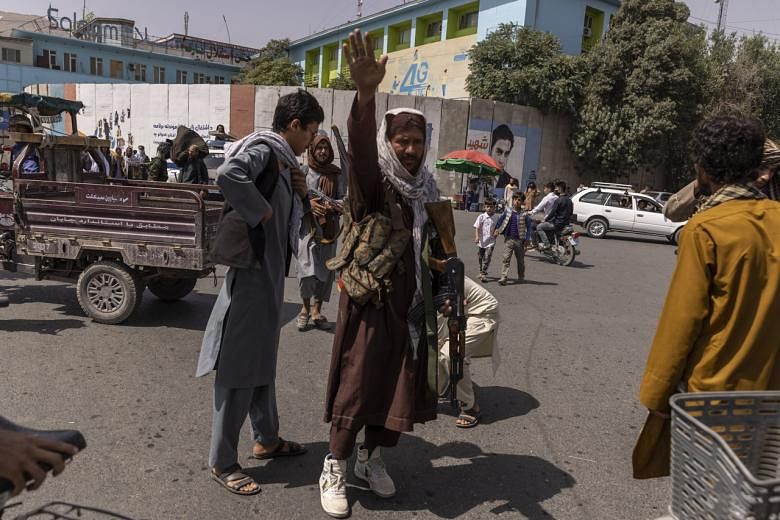BEIJING (BLOOMBERG) - China is struggling at home to sell the Taleban as a suitable partner for a country waging a war on alleged Islamic extremism, as it prepares to embrace an Afghanistan led by the militant group.
State media and diplomatic attempts to paper over the group's past and present it as the "people's choice" have met sharp criticism at home from those familiar with the militant organisation's history of violence and repression of women.
Beijing has long linked the Taleban with the East Turkestan Islamic Movement, which it has blamed for terrorist attacks in Xinjiang.
Now, in the wake of the chaotic exit of US troops, China is embracing the group's return to rule, a strategic U-turn that has left many at home feeling whiplashed.
Further instability in Afghanistan could impact neighbouring Pakistan, where China has US$50 billion (S$68.21 billion) in Belt and Road investments, and send extremism over its border.
Foreign Ministry spokeswoman Hua Chunying appeared to moderate the official messaging at a news briefing on Thursday (Aug 19), pointing to foreign commentary characterising the Taliban as "more clear-headed and rational" than during its first period in power 20 years ago.
"Some people stress their distrust for the Afghan Taleban. We want to say that nothing is unchanged forever," Ms Hua said. "We need to see the past and present. We need to listen to words and watch actions."
The People's Daily, the mouthpiece of the Communist Party, posted a brief video history of the Taleban on Monday without mentioning its links to terrorism.
The 60-second clip said the group was formed during Afghanistan's civil war by "students in refugee camps" and expanded with the "support from the poor", adding that it "has been in a war with the US for 20 years since the Sept 11 event".
The post, which was later deleted, became the fifth-ranked trending top on Weibo, after prompting a huge backlash from users questioning why a party newspaper tried to whitewash the group.
Some cited its violent past, including beheading people in the streets, destroying the famed Bamiyan Buddhas and banning women from work and study.
Foreign Ministry comments professing China's respect for "the will and choice of the Afghan people", suggesting the Taleban had popular support in the country, similarly raised questions.
A post on the WeChat blog Philosophia asking "Is Taleban the choice of the Afghanistan people?" was read more than 100,000 times, and widely shared on social media platforms, before it was censored on Thursday.
The possibility of Afghanistan women losing hard-won opportunities to study and work hit at a sensitive time in China.
Incidents such as the arrests of celebrity Kris Wu on rape allegations and an Alibaba Group Holding Ltd executive on a sexual assault charge have fanned a new wave of criticism against the entrenched patriarchy.
After a female Afghan filmmaker's plea for the world to pay attention to her country was scrubbed from Chinese social media sites, some users lashed out.
"The voice of Afghan people have all been censored by you!" one woman wrote.
Even the state broadcaster has found it hard to carve a single narrative, but appeared to have adopted a dual track for domestic and international audiences.
"People in Afghanistan are scared and some women are choosing to stay home," the state-backed China Global Television Network said in an English report targeting Western audiences on Wednesday.
"The Taleban has not given specifics on what respecting women's rights within the framework of Islam will entail."
On the same day, a Chinese-language report in CCTV4, the state broadcaster's channel for international news, spun a more optimistic picture.
While acknowledging some women expressed worries for future, the report said the situation in Kabul was "gradually returning to normal" and the Taleban had made multiple promises, including protecting women's rights, including allowing them to work and study.

